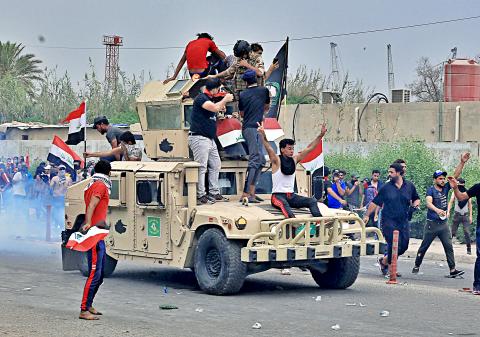Iraqi police on Friday fired live shots into the air, as well as rubber bullets and dozens of tear gas canisters, to disperse thousands of anti-government protesters in Baghdad.
Twenty-three protesters were killed and dozens were injured, security officials said.
The confrontations began early in the morning after anti-government demonstrations resumed, following a three-week hiatus.

Photo: AP
The protests began on Oct. 1 over corruption, unemployment and lack of basic services, but quickly turned deadly as security forces cracked down on participants, using live ammunition.
The protests then spread to several mainly Shiite-populated southern provinces, and authorities imposed a curfew and shut down the Internet for days in an effort to quell the unrest.
After a week of violence in the capital and the country’s southern provinces, a government-appointed inquiry into the protests determined that security forces had used excessive force, killing 149 people and wounding more than 3,000.
It also recommended the firing of security chiefs in Baghdad and the south.
Eight members of the security forces were also killed.
The protests are economically driven, largely leaderless and spontaneous against a sectarian-based system and a corrupt political class that has ruled for decades and driven the country to the brink of economic disaster.
The protests in Iraq threaten to plunge the country into a new cycle of instability that potentially could be the most dangerous this conflict-scarred nation has faced, barely two years after declaring victory over the Islamic State group.
Iraqi security forces and government officials vowed to avoid further deadly violence and deployed heavily on the streets of Baghdad in anticipation of Friday’s protests.
“They [leaders] have eaten away at the country like cancer,” 55-year-old Abu Ali al-Majidi said.
“They are all corrupt thieves,” he added, surrounded by his four sons who had come along for the protest.”
Thousands of people began converging to Baghdad’s central Tahrir Square early on Friday, carrying Iraqi flags and posters calling for change and reform.
However, after thousands of protesters removed metal security barriers and crossed the Jumhuriyya Bridge leading to Baghdad’s heavily fortified Green Zone, home to the US Embassy and Iraqi government offices, soldiers fired tear gas to disperse them.
After they tried to remove concrete barriers near the entrance of the Green Zone, they fired live rounds to push the protesters back.
“Baghdad hurra hurra, fasad barra barra!” the demonstrators chanted, which is Arabic for “Baghdad is free, corruption is out.”
Riot police in full gear and armed soldiers lined the bridge. Ambulances and tuk-tuks zipped back and forth, ferrying the injured to hospitals.
A reporter for Iraq’s Sumariyya TV channel was among the injured.
Security and hospital officials said the dead included eight protesters who were killed in Baghdad. The remaining deaths were distributed across the provinces of Basra, Nasiriyah, Misan and Muthanna in southern Iraq.
The officials spoke on condition of anonymity.
Hundreds of people were taken to hospitals, many with shortness of breath from the tear gas.
Protests spread to the southern provinces later on Friday, including the flashpoint city of Basra where about 4,000 people gathered near the provincial government building.

Kehinde Sanni spends his days smoothing out dents and repainting scratched bumpers in a modest autobody shop in Lagos. He has never left Nigeria, yet he speaks glowingly of Burkina Faso military leader Ibrahim Traore. “Nigeria needs someone like Ibrahim Traore of Burkina Faso. He is doing well for his country,” Sanni said. His admiration is shaped by a steady stream of viral videos, memes and social media posts — many misleading or outright false — portraying Traore as a fearless reformer who defied Western powers and reclaimed his country’s dignity. The Burkinabe strongman swept into power following a coup in September 2022

‘FRAGMENTING’: British politics have for a long time been dominated by the Labor Party and the Tories, but polls suggest that Reform now poses a significant challenge Hard-right upstarts Reform UK snatched a parliamentary seat from British Prime Minister Keir Starmer’s Labor Party yesterday in local elections that dealt a blow to the UK’s two establishment parties. Reform, led by anti-immigrant firebrand Nigel Farage, won the by-election in Runcorn and Helsby in northwest England by just six votes, as it picked up gains in other localities, including one mayoralty. The group’s strong showing continues momentum it built up at last year’s general election and appears to confirm a trend that the UK is entering an era of multi-party politics. “For the movement, for the party it’s a very, very big

ENTERTAINMENT: Rio officials have a history of organizing massive concerts on Copacabana Beach, with Madonna’s show drawing about 1.6 million fans last year Lady Gaga on Saturday night gave a free concert in front of 2 million fans who poured onto Copacabana Beach in Rio de Janeiro for the biggest show of her career. “Tonight, we’re making history... Thank you for making history with me,” Lady Gaga told a screaming crowd. The Mother Monster, as she is known, started the show at about 10:10pm local time with her 2011 song Bloody Mary. Cries of joy rose from the tightly packed fans who sang and danced shoulder-to-shoulder on the vast stretch of sand. Concert organizers said 2.1 million people attended the show. Lady Gaga

SUPPORT: The Australian prime minister promised to back Kyiv against Russia’s invasion, saying: ‘That’s my government’s position. It was yesterday. It still is’ Left-leaning Australian Prime Minister Anthony Albanese yesterday basked in his landslide election win, promising a “disciplined, orderly” government to confront cost-of-living pain and tariff turmoil. People clapped as the 62-year-old and his fiancee, Jodie Haydon, who visited his old inner Sydney haunt, Cafe Italia, surrounded by a crowd of jostling photographers and journalists. Albanese’s Labor Party is on course to win at least 83 seats in the 150-member parliament, partial results showed. Opposition leader Peter Dutton’s conservative Liberal-National coalition had just 38 seats, and other parties 12. Another 17 seats were still in doubt. “We will be a disciplined, orderly